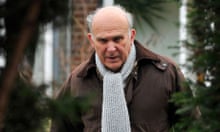Max Mosley, the former Formula One boss, lost his legal challenge to force newspapers to warn people before publishing stories exposing their private lives, after a European court ruled on Tuesday that such as system would have a "chilling effect" on the press.
The ruling by the European court of human rights in Strasbourg will mark the last stage in Mosley's campaign for tighter privacy laws following revelations about his sex life in the News of the World.
In 2008 the UK high court awarded him £60,000 damages after ruling that there was no justification for a front-page article and pictures about his meeting with five prostitutes in a London flat.
But Mosley pursued the case to the European court, challenging UK privacy laws that allow publication without giving their targets advanced warning.
The court said on Tuesday that the actions of the News of the World were "open to severe criticism" for publishing not only a print story, but also photographs and video footage obtained through covert recording, "which appears to have been included in the News of the World's coverage merely to titillate the public and increase the embarrassment of the applicant".
However, the court added it has "consistently emphasised the need to look beyond the facts of the [News of the World] case and to consider the broader impact of a pre-notification requirement".
It said such a pre-notification process for newspaper exposés is likely to have a "chilling effect" on the media and that there are "significant doubts" as to the effectiveness of such a system.
"The court is of the view that article 8 does not require a legally binding pre-notification requirement. Accordingly, the court concludes that there has been no violation of article 8 of the convention by the absence of such a requirement in domestic law," the Strasbourg ruling stated.
Article 8 of the European convention on human rights guarantees the right to respect for private life.
Mosley responded to the Strasbourg ruling by indicating that he had not given up in his fight to force newspapers to warn people before publishing stories exposing their private lives. Asked if he had a message for newspaper editors, Mosley said: "It's not over yet."
"I think it's absolutely essential to do everything one can to preserve people's privacy - people's freedom in that sense - and whatever I can do in that regard I am going to do," he told the BBC News channel. "It's a little bit sad there is a gap in the law which should have been closed where newspapers ambush people. It should have been closed. Maybe it will be one day."
Mosley denied that the changes to the law that he wanted would lead to a new wave of superinjunctions. "In the overwhelming majority of cases the person knows beforehand ... It is a small minority of cases where you are ambushed."
Asked if today's ruling was a victory for freedom of expression, he replied: "I don't think so because we already have freedom of expression. This is just about whether a newspaper should have the right to publish very private aspects of people's lives in which there is no public interest, purely for titillation, to sell newspapers."
The court ruling noted that Mosley had not managed to cite a "single jurisdiction in which a pre-notification requirement as such is imposed".
"In so far as any common consensus can be identified, it therefore appears that such consensus is against a pre-notification requirement rather than in favour of it," the court said.
The court also said that instituting a pre-notification system would "only be as strong as the sanctions imposed for failing to observe it" and that fines would have to be "set at a punitively high level" to deter newspapers.
This would "run the risk" of being incompatible with article 10, freedom of expression, and that it "might operate as a form of censorship prior to publication".
"The threat of criminal sanctions or punitive fines would create a chilling effect which would be felt in the spheres of political reporting and investigative journalism," it said.
However, the court did rule that the UK Press Complaints Commission's editors' code be amended to include a requirement that journalists should "normally notify the subject of their articles prior to publication, subject to a 'public interest' exception".
Law firm Wiggin said that while Mosley does have the right to appeal, the judgment is so "decisive" that his chances of overturning it "look poor".
Bob Satchwell, executive director of the UK's Society of Editors, told the BBC News channel: "It's very important to everybody and to the general public in particular that the media should be free to do its job which is an important part of the democratic process."
"If the media is fettered then it is in effect saying that all of us as individuals are having their own right to freedom of expression interfered with. Freedom of expression in the final analysis is more important than privacy."
Mosley's lawyer told a hearing in January that the failure of UK law to oblige newspapers to notify their "victims" before exposing their private lives violated the European human rights convention, to which Britain is a signatory.
The high court damages award did not restore Mosley's privacy, said Lord Pannick QC – but "prior notification" would have given him the chance to seek an injunction preventing publication.
The UK government argues that national authorities should have a "wide margin of appreciation" in deciding how national laws should be made compatible with human rights rules under the convention.
It says the current UK rules strike a good balance between the "right to private life" and the "right of freedom of expression" – both explicitly guaranteed by Articles 8 and 10 respectively of the convention.
Newspapers bosses have also warned that imposing a "pre-publication notification" to toughen the "right to private life" would amount to a breach of the "right to freedom of expression".
Newspapers often keep stories secret to avoid getting an interim injunction from the subject of the claims, postponing publication.
To contact the MediaGuardian news desk email editor@mediatheguardian.com or phone 020 3353 3857. For all other inquiries please call the main Guardian switchboard on 020 3353 2000. If you are writing a comment for publication, please mark clearly "for publication".








